Regatta Benefits Hospice
Yacht Club Raises $65K for Visiting Nurse & Hospice Care
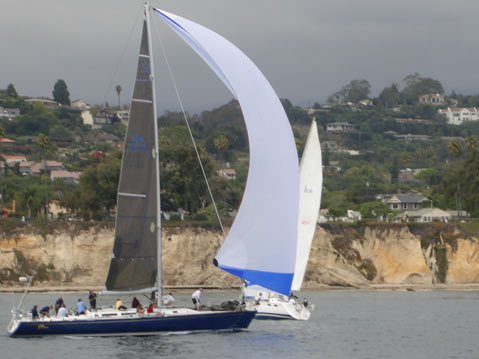
Through a calm fog resting on the surface of the Santa Barbara harbor, and a slow breeze hugging pelicans close to one another, a cluster of sailboats crept across the ocean’s face on Sunday, September 13, bent, it might appear, on capturing Jack Sparrow, Davy Jones, and the Kraken all in one bag.
But in truth, these floating urchins were giving up their booty in collective thousands.
The Santa Barbara Yacht Club hosted its fifth annual Yachts of Love Charity Regatta event to benefit the local Visiting Nurse & Hospice Care Organization through raffle prizes, a hearty selection of food, and, above all, sail boat races.
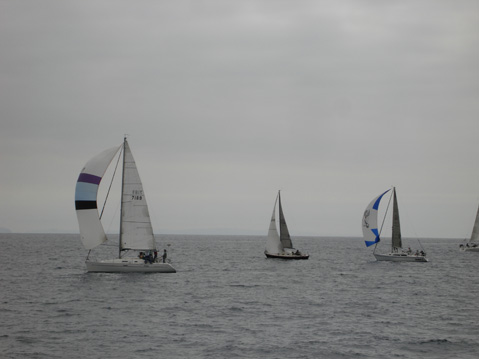
With close to 150 sailors, yacht club members, and supporters in attendance-including Santa Barbara Fire Chief David Sadecki and radio personality Laura Schlesinger-Regatta chairperson Tony Papa hoped this year’s event would ring in more than last year’s total of $75,000. It came close.
The Yacht Club, which was established seven years after the end of the Civil War, has 750 members who, said Papa, have “traditionally participated in a variety of charities” and done much to contribute to their community. “The Visiting Nurses have been around for over 100 years,” said Papa. “They are dynamically local.”
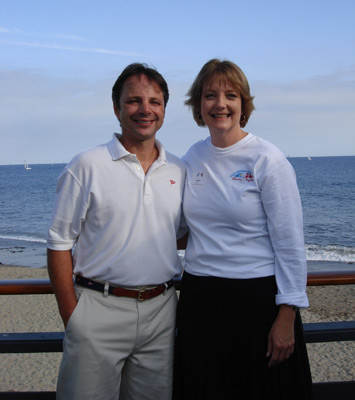
Tamara Skov, executive director of Visiting Nurse & Hospice Care said her organization serves about 4,000 people yearly, some of whom live at Serenity House. Eighty-six percent of their patients need some form of subsidizy. About half need some cash assistance, while the other half require hospice care, home health care, or non-medical personal care like bathing, transportation, etc. “No one’s turned away because of an inability to pay,” said Skov.
And that’s where the Regatta steps in. “[I am] incredibly grateful to the Yacht Club for helping us take care of people who otherwise have no where else to go at the end of their lives,” said Skov.
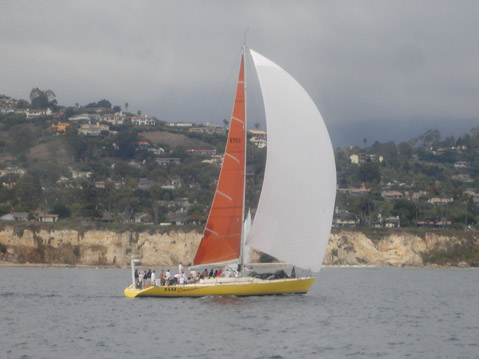
And since the Yacht Club specializes in boating, it only made sense to host a regatta (the word means “sailboat race” in Italian) to raise funds for the organization.
The race was divided into two categories: The Performance Handicap Racing Fleets (PHRF) were arranged so that faster, lighter boats could not necessarily defeat slower, heavier boats. By the end of the race, times were adjusted according to the handicap so that the outcome of the race is determined by a team’s sailing skills and not their equipment. The Club Handicap Racing Fleets (CHRF) were run and judged in the same manner, but comprised exclusively of club members.
With the sound of a canon, and a salute from two World War II B52 Bomber planes that were flying above, the teams prepared to race.
Land lovers watched from the yacht deck as the sun started peeking through the clouds and the fleets made ready to receive flag, sign, and horn signals from sailor Dana Jones, who decided the start time of the race as well as it’s surprise course. Jones-whom Papa described as the Club’s “resident stud racing director and best race coordinator”-lived up to expectations, checking wind direction, speed, and various other complex indicators of satisfactory sailing conditions before finally starting the race. As the fleets sallied forth, conversation about racers like radio person Julie Ramos, and Fiesta’s 2009 El President Anthony Borgatello, stirred the now humid air.
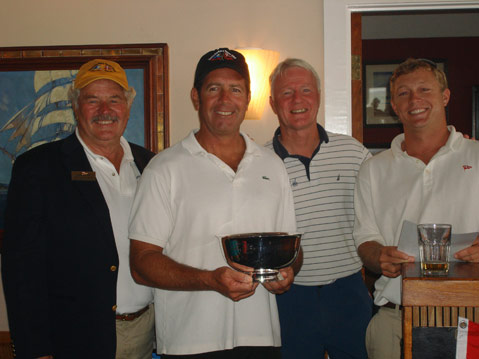
Out on the ocean, competitors gripped spinnakers and averted collision. The field was close, with the racers close upon each others’ sterns. Riding with Gary and Janet Gordon on their beloved Moomba-which Janet said means “Let’s have a good time” in Australian-was their friend and Visiting Nurse social worker Cheryl Bench, who gave a perspective of the race not seen from shore. And despite the obvious excitement of the race, Bench’s presence on the Moomba was a reminder of the race’s purpose. “The fact they do this every year is wonderful,” said Bench. “It makes the job easier when I can say to [patients] that we have funds, and they don’t have to worry about anything.”
The Gordon’s boat cruised through the pack, circling past Dr. Laura and her Warrior‘s red sail; Dave Sadecki and his team’s white Skiah Dhu; and the seemingly overpopulated, tipping Taxi ridden by Dick Compton, Tom Parker, and Jim Yabsley.
Pulling up to the Mesa then circling back towards the harbor through obstacles of seals and sea lions, kelp, gulls and other teams, only one contributor from each category came out on top.
CHRF first place finishers Max and Shirley Lynn and PHRF first placer Dirk Friedlin celebrated their wins with food and friends. Sadecki, an experienced sailor and crewmember on Friedlin’s team, racing with the club for only the second time, called the charity event very friendly and generous all around. “I think it’s a really good group of people,” said Sadeki. “They get people [on teams] who have never sailed before.” Friedlin fought a close race with Dr. Laura’s Warrior, which came in five seconds after the Skiah Dhu.Friedlin let Sadecki receive and keep the award because “he’d appreciate it.”
But while sailors won cups, and participants won raffle prizes-like a trip to Costa Rica, or free boat cleaning-the real winner was Visiting Nurses & Hospice Care of Santa Barbara, which received upwards of $65,000, said Papa, “despite the economy.”
“This is my club,” said Friedlin. “This is what we do for the community.”



